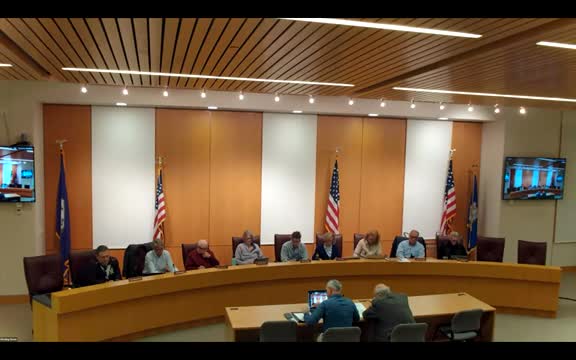New Canaan wetlands commission approves Hillcrest Road culvert repair with planting and compliance condition
Get AI-powered insights, summaries, and transcripts
Subscribe
Summary
The New Canaan Inland Wetlands Commission unanimously approved an application to replace a failing 12-inch corrugated metal driveway culvert at 70 Hillcrest Road, add boulder stabilization and native plantings, and require a post-construction landscape compliance report.
The New Canaan Inland Wetlands Commission on Monday unanimously approved an application to replace a failing 12-inch corrugated metal driveway culvert at 70 Hillcrest Road and stabilize the crossing with boulders and native plantings.
The decision came after the applicant’s agent described efforts to address chronic drainage issues around a 60-year-old house and to reduce future erosion. “The driving force behind our application is drainage,” Mr. Simpson said, explaining the plan would remove the driveway over the pipe, install a new smooth-bore plastic pipe and stabilize inflow and outflow with boulders and plantings.
The commission’s discussion focused on downstream impacts, machinery and erosion controls. Commissioner Sandy Redden said, “I think the site visit was very helpful,” and asked whether a larger-diameter pipe had been considered to reduce clogging. Mr. Simpson said the applicants chose to replace the existing 12-inch pipe so as not to increase downstream flows: “we don't want that to adversely affect anybody downstream.” Commissioner Dan Stepanek raised a similar concern, saying, “If you clean this thing up ... the water is gonna just travel through there a lot quicker.”
Town wetlands staff said notification requirements were met and emphasized that most driveway culverts are privately owned. “The requirement for notification was satisfied by the applicant,” Kathleen Holland said, noting the town favors repair rather than upsizing a culvert that could increase flow velocity.
Contractors will use an excavator to trench under the driveway for a brief period, set boulders to dissipate energy at the outfall and place native shrubs and stabilizing seed on disturbed areas. The applicants said invasive vegetation removed during work would be hauled off-site and larger volumes of soil brought in if driveway widening requires fill.
Commissioner Holland (staff) requested a final planting and completion compliance report after construction; the motion to approve included that condition. The application was recorded as IWDASH25-4170; the commission’s vote to approve was unanimous.
The commission also discussed timing and logistics: the applicants said they would begin work as soon as permits were issued and hoped to blacktop the driveway before the asphalt season closed. Staff and the applicants agreed erosion controls (silt fence and hay bales) would be installed before excavation and that planting could occur this fall or next spring depending on material availability.
The commission’s action authorizes the specific repairs and associated stabilization measures described in the approved application. The approval includes the condition that the landscape architect or contractor provide a final compliance report certifying completion of required plantings and stabilization work.
